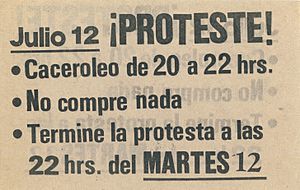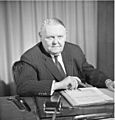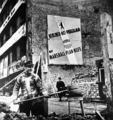Neoliberalism facts for kids
Neoliberalism is a set of ideas about how a country's economy and society should work. It's about how much the government should be involved in business and people's lives.
The term was first used in the mid-1900s by a group of thinkers called liberals. They wanted to create a "social market economy." Today, people often use the word "neoliberalism" when they are talking about or criticizing ideas related to globalization (when countries become more connected) and trade unions (groups that protect workers' rights).
Some important thinkers who developed these ideas include economists Friedrich Hayek, Wilhelm Röpke, and Walter Eucken. They first shared their ideas at a meeting in 1938.
Contents
What is Neoliberalism?
Neoliberals generally believe in a free market economy. This means that businesses and people should be mostly free to make their own choices. They think that prices should be set by what people are willing to pay. They also believe in private property, where individuals own businesses and resources.
However, neoliberals also think that sometimes the free market doesn't work perfectly. In these cases, they believe the state (the government) should step in. The government's main job would be to make sure the market stays fair and competitive.
How the Government Helps
The government might take action to:
- Stop monopolies and cartels. These are when one company or a small group of companies control an entire market.
- Make sure there is social fairness. This means everyone has a fair chance.
- Create equal opportunities for all citizens.
- Deal with "external effects." These are when a business's actions affect others who are not part of the deal. For example, pollution from a factory.
- Help reduce big ups and downs in the business cycle (when the economy grows or shrinks).
Neoliberals are also okay with groups trying to influence government decisions (called lobbying). They support government actions that protect a country's own businesses. This could include import duties (taxes on goods from other countries) or subsidies (money given to certain businesses).
They do not like economies where the government controls everything. They also don't fully support the "Laissez-faire" idea. Laissez-faire means the government should almost never interfere with the economy. Neoliberals believe some government involvement is needed for a healthy market.
Countries with Neoliberal Ideas
Many countries have used some neoliberal ideas in their governments. Here are a few examples:
- Germany under Ludwig Erhard developed a "social market economy."
- Chile under Augusto Pinochet saw big economic changes.
- The United States under Ronald Reagan had policies that reduced government rules.
- Great Britain under Margaret Thatcher also brought in many free-market changes.
- New Zealand under David Lange made significant economic reforms.
Images for kids
-
Builders in West Berlin, 1952
-
Chilean (orange) and average Latin American (blue) rates of growth of GDP (1971–2007)
-
Wealth inequality in the United States increased from 1989 to 2013.
-
The European Union–Mercosur free trade agreement would create one of the world's largest free trade areas.
See also
 In Spanish: Neoliberalismo para niños
In Spanish: Neoliberalismo para niños











